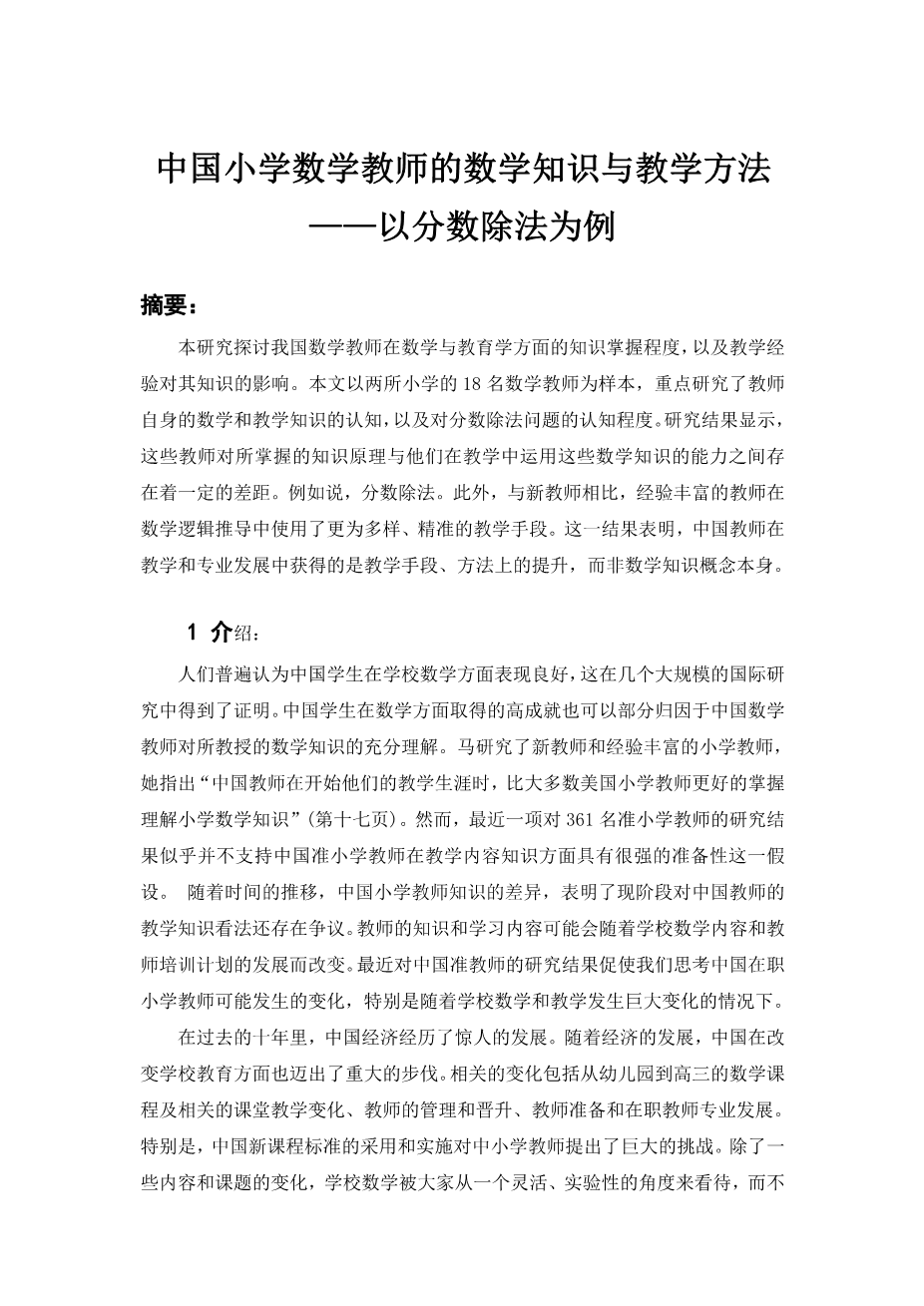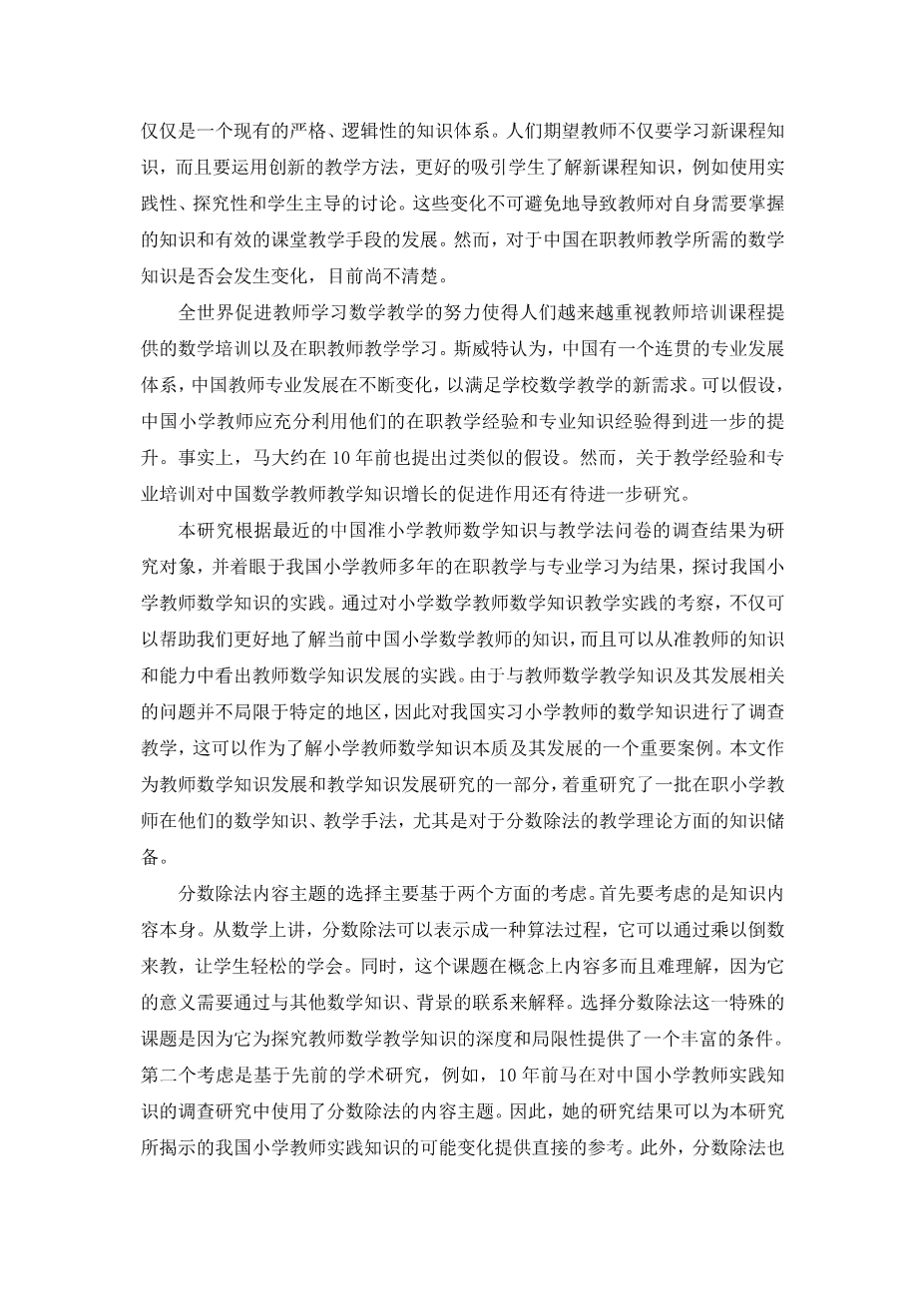中国小学数学教师的数学知识与教学方法 ——以分数除法为例外文翻译资料
2022-08-19 15:16:29
Chinese elementary mathematics teachersrsquo; knowledge in mathematics and pedagogy for teaching: the case of fraction division
Abstract In this study, we investigated the extent of knowledge in mathematics and pedagogy that Chinese practicing elementary mathematics teachers have and what changes teaching experience may bring to their knowledge. With a sample of 18 mathematics teachers from two elementary schools, we focused on both practicing teachers'beliefs and perceptions about their own knowledge in mathematics and pedagogy and the extent of their knowledge on the topic of fraction division. The results revealed a gap between these teachers'limited knowledge about the curriculum they teach and their solid mathematics knowledge for teaching, as an example, fraction division. Moreover, senior teachers used more diverse strategies that are concrete in nature than junior teachers in providing procedural justifications. The results suggested that Chinese practicing teachers benefit from teaching and in service professional development for the improvement of their mathematics knowledge for teaching but not their knowledge about mathematics curriculum.
Keywords Elementary teachers ·Teachers'knowledge ·Teachers'perceptions ·Fraction division ·China
1 Introduction
It is generally perceived that Chinese students perform well in school mathematics, as evidenced in several large-scale international studies (e.g., Lapointe, Mead, amp; Askew, 1992; Mullis, Martin, Gonzalez, amp; Chrostowski, 2004). Equally well perceived, Chinese mathematics teachers had superior understanding of the school mathematics they teach, which has been taken to provide a partial explanation for Chinese students'high achievement in mathematics (e.g., An, Kulm, amp; Wu, 2004; Ma, 1999). With the inclusion of both novice and experienced elementary teachers in her study, Ma also indicated that"Chinese teachers begin their teaching careers with a better understanding of elementary mathematics than that of most USA elementary teachers"(p. xvii). However, the results from a recent study that involved 361 prospective elementary teachers in China did not seem to support the hypothesis that prospective elementary teachers in China may have strong preparation in pedagogical content knowledge (Li, Ma, amp; Pang, 2008). The differences in Chinese elementary teachers'knowledge over time suggest that it may not be appropriate to hold a static perception about teachers' knowledge, in the case of China. What teachers know and can learn is likely to change along the development in school mathematics and teacher preparation programs. The results recently obtained from the study with Chinese prospective elementary teachers prompted us to wonder what may happen to Chinese in-service elementary teachers, especially with the dramatic changes in school mathematics and instruction happening in China.
Over the past decade, China has experienced phenomenal development in its economy. Associated with its economic development, China has also undertaken large steps in changing school education. Relevant changes include mathematics curriculum from kindergarten to grade 12 and associated changes in classroom instruction (e.g., Li, 2008a), teachers'regulation and promotion (e.g., Li, Huang, Bao, amp; Fan, 2008), teacher preparation (e.g., Li, Zhao, Huang, amp; Ma, 2008), and in-service teacher professional development (e.g., Huang amp; Li, 2008). In particular, the adoption and implementation of new curriculum standards in China posed enormous challenges to elementary and secondary school teachers (e.g., Zhang, Huang, Li, Qian, amp; Li, 2008). In addition to some content topic changes, school mathematics is now viewed from a dynamic and experimental perspective rather than only as a body of strict and logical knowledge already in existence. Teachers have been expected not only to learn about the new curriculum, but also to use innovative instructional methods that can actively engage students, such as the use of manipulative, exploration, and student-led discussions. These changes can inevitably lead to possible development in what teachers need to know and be able to do for carrying out effective classroom instruction. However, much remains unclear about possible changes in Chinese in-service teachers'mathematics knowledge needed for teaching.
Worldwide efforts to facilitate teachers'learning of mathematics for teaching have led to the increased emphasis not only on the mathematics training provided through teacher preparation programs (e.g., Conference Board of the Mathematical Sciences [CBMS], 2001), but also on in-service teachers'learning through teaching (e.g., Huang amp; Bao, 2006; Leikin amp; Zazkis, 2007). Stewart (2006) observed that China has a coherent professional development system, and support for teachers'professional development in China is also changing to meet the needs of the new demands in school mathematics and instruction (Huang amp; Li, 2008). It can be hypothesized that Chinese practicing elementary teachers would benefit from their in-service teaching experience and professional learning for further developing their knowledge. In fact, Ma (1999) made a similar hypothesis about 10 years ago. Yet, much is left to be understood about the extent of changes teaching experience and professional learning may contribute to Chinese practicing teachers'knowledge growth in mathematics for teaching. With the findings from the recent survey of Chinese prospective elementary teachers'knowledge in mathematics and pedagogy for teaching (Li, Ma, amp; Pang, 2008), this study also aims to focus on practicing elementary teachers'mathematics knowledge as a result of their years of in-ser
剩余内容已隐藏,支付完成后下载完整资料


英语译文共 7 页,剩余内容已隐藏,支付完成后下载完整资料
资料编号:[410694],资料为PDF文档或Word文档,PDF文档可免费转换为Word




